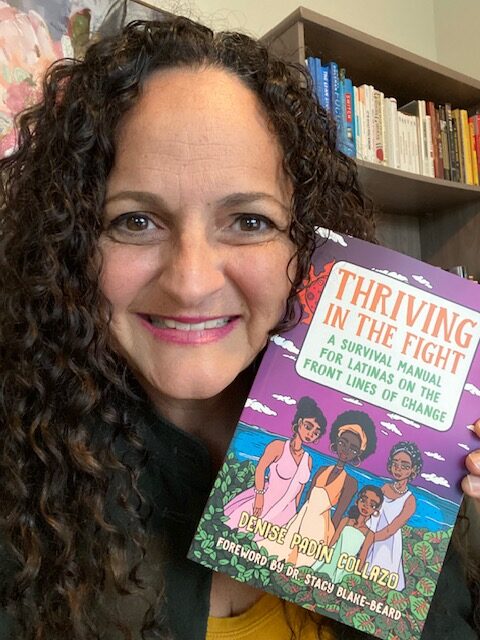
Denise Collazo has over 25 years of experience as an organizer and is currently the Chief of External Affairs for Faith in Action. She is a passionate advocate for women of color and the power that they bring to any space they are involved in. She recently wrote her book Thriving in The Fight as a love letter to Latina organizers. Keep reading to learn more about her experience as a woman in organizing.
Tell me about your story. What do you think guided you to this point in your life?
I remember sitting in a cold church basement, surrounded by a bunch of other leaders and grassroots folks and religious folks, and thinking, “How did I end up here?” My dad always taught me that I have been gifted, and with that giftedness comes responsibility for where you come from. That place, that little shack right there is where I come from. That’s where I was born. And I can’t ever forget that. I’ve always had that desire to help people to remember who they were at their core.
What issue areas are you passionate about and why?
I love investing in the development of other people. That is one thing that I’m gonna do no matter where I am. When you do that, you are also learning constantly. I really do believe in the mission of Faith and Action. I believe that we have something unique that could unlock some really incredible change in this country and in this world. I don’t see a lot of places that have people working together in communities across a whole bunch of different racial, sexual orientation, genders and religious demographics.
What inspires you to continue to work in the organizing space?
Building true relationships of love and trust in communities and fighting for change inspires me. All of us get down in this work. It’s very hard. There’s a lot of things that you see that just breaks your heart. But when I look around and ask myself where else could I go, I’m reminded that this collaborative collection of amazing people all in one place is special. This tremendous collection of talented leaders in communities across the country, and at the national level, at the state level. The brilliance of the people that I have the privilege of working with on a daily basis whether it’s to win multiple million dollar tax changes that help children in Massachusetts, for example, or in New Mexico recently there was a ballot measure that allowed for childcare to be a constitutional right. We’re just getting started. When I started as an organizer at Faith in Action, I was one of the very first women to have a family. I was the first Latina to come through, I was young. So to me that just feels amazing that we’ve created a space that is welcoming and open for black and brown women, for women of color, women who might be the sole provider in their family, women who might be single moms. The ability to do this work and have a good and full life. I think that is something that I wish everyone could have. I want that for everyone. So that’s part of what keeps me here day after day after day.
Can you share about why you wrote your recently published book, Thriving in the Fight?
I honestly can’t tell you why I wrote the book. I just knew I had to. When I was thinking about who I wanted to write the book for, and the person that I had in my mind the whole time I was writing the book was Nancy Palacios, who is an amazing organizer in Florida. Every room Nancy walks into, she’s the one with the most courage. I remember when I said to her that I was writing the book, she goes, “Well, hurry up and get it done.” So for me that was encouragement that it’s not, you know, it’s not, it is something that young, that emerging leaders would appreciate. It’s amazing now when I get to share the book with organizers. And what I’ve found is, it’s not just organizers who are resonating with the book. It’s also women who might be in their PhD program at university or women who are the owners of their own mechanic shop. Women who get treated in different ways, discriminated against because they’re Latina, because they’re Afro-Latina, because they’re Black. And it’s just one thing that has really surprised me too is I’ve gotten some direct feedback from Black women who have reached out to me to say thank you on behalf of my grandchildren who are Afro-Latino. Thank you for putting this book out. Thank you for saying the things that don’t get said. I’m currently on a book tour and I’m excited for the opportunity to talk to students, teachers, senators, members of Congress. It’s been amazing the kind of people who have responded to the message. I just think that what shows is that there’s too little that’s been written by Latinas for Latinas, and we just need more.
Within organizing, what are some women-specific issues that you’ve seen in the communities you’ve worked with?
When I was new Director in San Francisco, we did a lot of work where we were trying to make sure that mothers and children had access to healthcare in their own community. To me, that seemed like just a basic thing. We thought that there was a clinic that was gonna close and we fought to keep it open. A lot of moms are trying to figure out how to work, take care of their kids, pick them up after school, and find a safe place to live. And so you kind of look at reality and go, you know, well we did this, but really what was needed was something much bigger. And that can get discouraging. But you also know that you’re planting seeds that will grow in the future. Here in Puerto Rico, it’s the women who are leading the charge to change things. And it’s the women that are serving as the neighborhood emergency response team. They live on the front lines of climate change, racial injustice, economic challenges, and in a community that has predominantly just ignored and left out.
What’s one thing you wish people knew about women in organizing?
Women are the pillars of our communities. Women are the bones that hold our communities together. You know, there’s all these stereotypes that women are supposed to be more cooperative and men are supposed to be more competitive. At least that’s what has been conditioned into our society. When I first started organizing, there was still a question in people’s minds as to whether women could be organizers. I know that women generally have their finger on the pulse of community and what is actually happening. Not what should happen or what could happen, but what actually is happening. So what’s happening to kids? I’m sure other people could speak to that particular piece a little better than me, but I just think we have a special ability to speak and listen and approach things.
How does your faith drive you to organize?
I started organizing shortly after college. I didn’t know what organizing was. I grew up in church and I think college was just for me to answer the question for myself about whether this was my faith or this was the faith of my parents. I was on the run when I found organizing. I thought I was actually running away from faith, but I found myself sitting right in the center of a whole bunch of people who are doing incredible work. I feel really lucky as a person to have found this work so early in my professional career. I really kind of just felt myself drawn to it. For me, the intersection between my beliefs and who I am as a person.
What advice would you give to organizers, specifically young women organizers, that are just starting?
Yeah, organizing is really about building relationships with people and not superficial transactional relationships, but building real relationships with people. We had this old framework that was very social work oriented, and you kind of kept clinical and separate from the people that you work with, and I just don’t buy that. You’re not gonna run through fire with people that you don’t know and people that you don’t know well. Do your 15 one to ones a week. Do it in a way that you’re not just meeting with them because you want something out of them, but you actually believe in them. If you don’t have a deep curiosity and love and hunger for people and their stories and are really investing in them, then this is not the work for you. I think what keeps me in and draws me into the work and what I think will make any successful organizer is someone who really, really loves people and who is willing to deal with whatever mess they have. We all have our own stuff that we gotta deal with. You organize because you think you wanna go help people and be with people. In reality, the person who is always getting refined in this work is yourself. So if you’re down for getting to know some of the most amazing people in the universe and you’re willing to look at your own stuff over a long period of time and deal with it, then organizing is where you should be.
